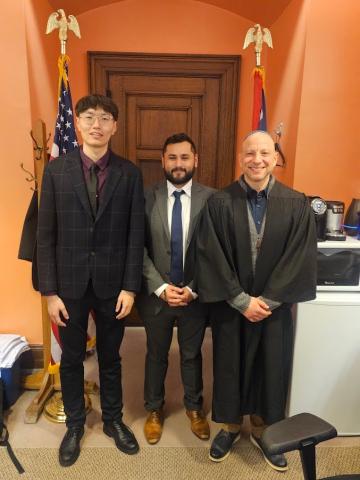The Human Trafficking Law Clinic (HTLC) at Case Western Reserve University School of Law is an interdisciplinary program (involving social work and law students together) that works on three systems levels (direct representation, community outreach and education, and legislative advocacy) to provide comprehensive legal assistance and trauma-responsive social services to adult sex and labor trafficking survivors, and those populations with heightened vulnerability for trafficking.
Targeted populations include identified sex and labor trafficking survivors, members of the lesbian, gay, bisexual, transgender, queer (+) (LGBTQ+) community, individuals with substance use problems or experiencing housing instability, and individuals living under 300% of the Federal Poverty Level.
The Human Trafficking Clinic is funded by a grant from the Ohio Attorney General's Office administration of the State Victims Assistance Act (SVAA) and the federal Victims of Crime Act (VOCA) grant programs.
Direct Services Engagement
The HTLC focuses on legal wellness (preventive legal screenings and issue identification), direct civil legal representation, and referral to social service agencies to address the holistic whole-person needs of clients. The combination of our legal focus combined with the addition of social service support assists with the sustainability and stabilization of the clients that we engage.
General areas of the law that we assist with include: expungement and record sealing, name and gender marker correction, protection orders, social security benefits, warrant block identification, fee waiver requests, identity theft, child support modification, driver’s license reinstatement, and debt negotiation.
Community Engagement
All students go into the community to conduct outreach and intake. While specific sites alternate each semester, examples include misdemeanor and felony human trafficking dockets in Cuyahoga County, The Rape Crisis Center Human Trafficking Drop-In Center, EmpowerHer Network, and B Riley Sober Living Center. In addition, students are given the opportunity to provide community-based training and education and awareness events around human trafficking.
Macro-Level Engagement
Students are given the opportunity to participate in monthly legal and legislative committees in the community and statehouse, working groups as part of the Collaborative to End Human Trafficking, and specialty groups with the Ohio Attorney General. As a part of these memberships, students conduct research, participate in drafting and input, and provide input and insight on community awareness projects. Invitation and attendance at the statehouse for Advocacy Days are possible, though legislative and semester-specific.


